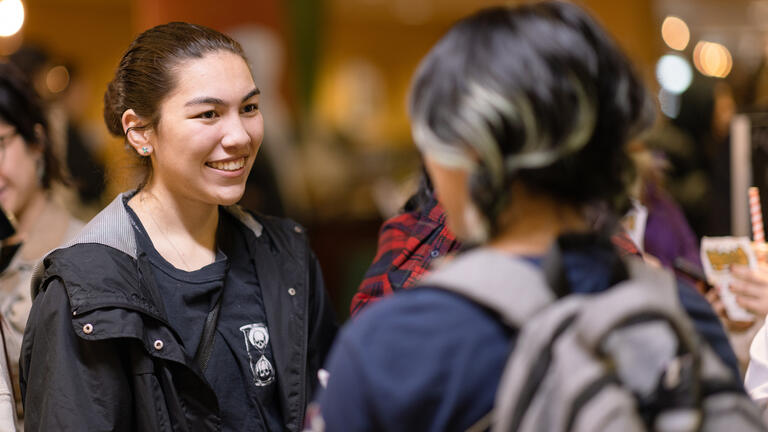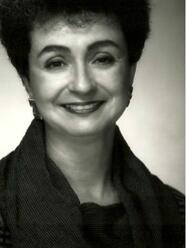
Life at USF
Esther Madríz Diversity Scholars
The Esther Madriz Diversity Scholars Living Learning Community is on hiatus for 2024-2025. Interested students: we invite you to check back next fall for future plans for the 2025-2026 school year.
Crossing Borders and Discovering Home
This living-learning community explores issues of diversity, inequality, social justice, and social change. To do so, we draw upon the idea of "crossing borders and discovering home." For us, borders refer to real and imagined boundaries placed around us as individuals, and as members of various communities. Named after the late Esther Madríz, beloved USF professor of sociology who embodied the Ignatian ideals of education of the whole person as a means toward social justice, Esther Madríz Diversity Scholars examine and challenge these boundaries to gain a fuller understanding of ourselves and the world around us.
For 2022-2023, EMDS LLC will focus on Afro-Caribbean diasporic music, arts, and community organizing against displacement from San Francisco to San Juan. Puerto Rican art and cultural practices have played a key role in helping people survive the violence of Spanish and U.S. colonialism, and in sustaining struggles for social change on the island and in the diaspora. We will consider how communities organize for autonomy and sustainability, and the particular role of art, healing and grassroots organizing in the fight for home, whether it is to defend the earth, stay in one’s home, or to migrate and begin anew. Two key features of the EMDS LLC are ongoing engagement with local community organizations in the Bay Area and a transborder travel-study trip to Puerto Rico during Intersession (January 2023)
The class begins with history and sociology of Puerto Rico and the Caribbean and the importance of the Afro-Caribbean diaspora for U.S. citizenship, politics, and culture. We will pay special attention to the connections between social history and traditional Puerto Rican music, the rhythms and stories that connect diverse diasporic musical traditions and genres, from bomba to son to salsa to hip hop and reggaeton. In dialogue with creative texts, artists, musicians and community organizers, students will analyze how the politics of nationality, race, gender, sexuality, disability, intersect with market forces and economic policy, impacting artists and social movements in the Bay and Puerto Rico. What resources for hope and lessons for social justice organizing do Puerto Rican artists and activists offer non-Puerto Rican communities? What can we learn from the powerful, creative activist work in defense of home and community here in San Francisco? How can we help defend our homes and communities through political practices that are more deeply inclusive, sustainable, and joyful.
Current and Incoming students can see more information and apply on the EMDS myUSF site.
Core Requirements Fulfilled
- Social Science (Core E)
- Cultural Diversity (CD)
- Service-Learning (SL)
Community Events
Successful applicants will live in the designated space for Esther Madríz Diversity Scholars in Toler Residence Hall. Students must apply to SHARE for housing by posted deadlines early in the Spring semester. All community members are required to enroll in the EMDS courses for both fall and spring semesters.
This learning community is a collaborative effort between the Sociology Department, the Leo T. McCarthy Center for Public Service and the Common Good, and Student Housing.
For more information, please contact Kathleen Coll at kmcoll@usfca.edu.
About Esther Madríz

Esther Madríz, a beloved professor of sociology, embodied the Jesuit ideals of educating the whole person and social justice.
Coming to the US from Venezuela, much of Esther’s life was about crossing borders. Sometimes these were national borders, at other moments these were race, gender and language.
Madríz joined USF as an assistant professor in 1996. In her relatively short career at the university, she co-founded USF's Latin American Studies program and was the key founder of the Center for Latino Studies in the Americas (CELASA). Her teaching and activism focused on many facets of criminology, including domestic violence, hate crimes, and human rights abuses against Latinos. She served on the boards of two community outreach and policy organizations as well as on the board of the USF-based Peace Review.
Community Activities and Events
EMDS Activities
Fall Retreat
To kick off the Fall semester, Esther Madriz Scholars participate in a weekend retreat. Throughout the weekend, students learn about Esther’s legacy, reflect on their identity and engage in dialogue around living and learning as a community of leaders. Over the course of the weekend, we will play, laugh, and develop bonds that will sustain the community over the coming year.
Karamus
Students also attend weekly community gatherings, or karamus, that are facilitated primarily by the RA and the community members. Karamu is a Swahili word generally referred to as "feast". For EMDS, we adapt the usage to reflect the celebratory gathering of our community to engage in reflection and discussion. As such, these meetings are a cross between a course “lab” and a club meeting. Karamus are an opportunity to process what you are learning in the classroom as well as work together to organize fundraising and community service activities. As part of karamu, students also attend off campus educational and cultural events.
In the Classroom
During the academic year, EMDS students take two classes — Social Problems and Community Organizing — that fulfill three graduation requirements: cultural diversity (CD), social science core (Area E), and service-learning (SL). During the fall semester, we put our sociological imaginations to use to examine the ways that race, class, gender, and sexuality intersect and structure our lives. In January we participate in an optional (but strongly encouraged) transborder travel experience. Finally, during spring semester, students enroll in Community Organizing and work with a community partner dedicated to social justice to create change in the Bay Area.
Social Change Projects & "Fight the Power"
Throughout the year, we ask, "How does social change happen? And what do we need to know to be effective change agents?" A major component of the program is service learning. In this capacity students provide service as needed by our community partner, as well as act as a participant researcher, gathering data to help inform their understanding of the causes and consequences of social problems, activism, and social change. Over the course of the year, students create social change projects that apply their classroom learning to real life issues. Students have produced a 40-minute feature film entitled SMOG, that looked at how systems of oppression keep us from really seeing each other; created a public art exhibit on Gleeson Lawn titled “Thinking inside the Box,”; facilitated a USF day that brought local middle school students to the University; as well as organized a “Rock the Vote” event to encourage USF students to make their voices heard in the 2012 election. Recently EMDS students in conjunction with Esther Madriz Activist Scholars or EMAS have organized “Fight the Power.” This event brings together the USF community to educate and mobilize students to be agents of change in their own communities.
Transborder Experience (TBX)
The transborder travel experience takes place during winter intersession. This travel-study experience is unique for several reasons. First, we intentionally travel to two locations and examine the same social problems from these different perspectives. Second, this experience provides an opportunity for us “cross a border” before the end of the program. In this way, the trip is not a culminating project, but an integral part of the year-long learning that informs the academic as well as service experience during spring semester. During each trip, students meet with scholars, student leaders, community leaders and activists to learn how to work as allies, as well as how to utilize various social change strategies. Previous locations include: San Diego, CA – Tijuana, Mexico; New York, NY – San Juan, Puerto Rico; Atlanta, GA – New Orleans, LA; New York, NY – Marseilles, France; New York, NY – Boston, MA; and Havana and Santiago de Cuba, Cuba. During the 2022-23 academic year, we plan to go to San Juan, Puerto Rico.
Events
Esther Madriz Dinner
The annual Esther Madriz dinner honors the memory of Dr. Esther Madriz, vivacious teacher, social activist and esteemed colleague. In honoring her life, the dinner also highlights her legacy, and how students like the Esther Madriz Diversity Scholars share her commitment to social justice and exemplify Esther’s spectacular gifts to USF and the world.
Student Reflections
EMDS attracts students who are passionate about social justice and activism. We have been fortunate to have a community of student scholars ranging from ten to twenty members. Men and women come together to strengthen this program and offer various insights and lenses to our work. Below are a few comments shared by past participants.
Learn About Keyaira Lock '14, a Former Esther Madriz Diversity Scholar
Three Students Reflect on their EMDS Experience:
This retreat in itself came as a surprise to me. I didn’t realize how much I’d get out of it. I just simply thought it would be a lot of sharing, talking, but it was more. We found the definition to what and who we are as a community under Esther Madriz really is. It is more than just a living-learning community — we represent all that Esther lived for. She was a woman of justice, peace, and love, a servant to mankind. She was not afraid to accept differences in people. The legacy I hope to leave behind for future communities is the attitude of openness. I want people after us to know we did good. WE as a community represented unity amongst a world of diversity and culture. We were the ones to empower generations after us."
It felt good putting on an event that could change the way some USF students view sexuality and gender. The best word I can think of to describe how I feel about the project is accomplished. I feel like I not only did a project for a grade but for, hopefully, the greater good."
Being a part of EMDS community was something that made myself step outside of my comfort zone, my box. I believe that joining it has made me a stronger person. I think that if I had not joined I would not be as open minded as I am today. Being in this community has really made a great impact in my life."